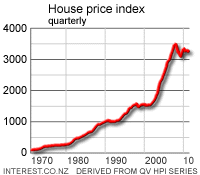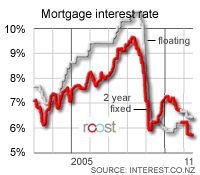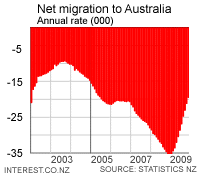 It is the elephant in the room of New Zealand politics right now. Everyone knows it, yet our leaders refuse to address it, partly because they and their generation benefited personally through the massive house price inflation it created. I'm talking about the massive abuse of the tax system by property investors that has allowed them to set up various types of trusts and Loss Attributing Qualifying Companies (LAQCs) that make losses on investment rental properties to reduce their personal income tax bills. It's only just dawned on me (I'm slow on the uptake) that this is one of the major reasons for the property investment frenzy of the last 6 years that drove house prices to utterly unaffordable levels and has now created the conditions for a bursting of that bubble. It wasn't always this way.
It is the elephant in the room of New Zealand politics right now. Everyone knows it, yet our leaders refuse to address it, partly because they and their generation benefited personally through the massive house price inflation it created. I'm talking about the massive abuse of the tax system by property investors that has allowed them to set up various types of trusts and Loss Attributing Qualifying Companies (LAQCs) that make losses on investment rental properties to reduce their personal income tax bills. It's only just dawned on me (I'm slow on the uptake) that this is one of the major reasons for the property investment frenzy of the last 6 years that drove house prices to utterly unaffordable levels and has now created the conditions for a bursting of that bubble. It wasn't always this way.  Property investors used to make a profit from their rental properties. That was possible when house prices were half their current levels 6 years ago and interest rates were closer to 6% then 9%. Then the Labour-led government imposed the 39 cent tax rate and house prices started to take off. Low interest rates globally encouraged our banks to raise money on wholesale money markets and lend it to property investors. A frenzy developed. Every Mum and Dad in the land wanted to be a landlord, particularly a passive landlord. Share markets were slumping. Bank interest rates were low. It seemed the only way to invest and make money. As house prices accelerated and banks stepped up their efforts to lend to property investors, the capital gains were extraordinary, particularly for those who were highly leveraged. As prices galloped higher and interest rates rose, investors began to accept ongoing losses from their investment properties. They could be added to the 3% depreciation writeoff on the property. Then the magic of negative gearing became apparent to novice investors. It was even promoted by those touting the benefits of property investment in books and seminars. Losses on these investment properties were offset against the regular incomes of these Mums and Dads. The introduction of the higher 39 cent tax rate and the government's insistence on allowing bracket creep increased the incentive to negatively gear. Why give the government the money when instead it could be used to support a leveraged investment that could double and treble in value every couple of years? Easy decision to make. Effectively, the the government (and therefore all the other PAYE taxpayers) were subsidising leveraged investment in a non-productive investment funded by foreign debt. Brilliant public policy. Then if the property investor was careful, they could crystallise their gains without paying a capital gains tax. All they had to do was cross their fingers behind their back and tell the IRD they had no intention of trading the property for profit... No worries... I realise I have been writing this all in the past tense. I'm still amazed that this has been allowed to go on. There is no sense of anger yet from PAYE investors who are subsidising this speculative property investing. Yet it goes on and with a vengeance. I have asked the IRD and Treasury for data on the number of LAQCs set up in the last 5 years. No answer yet. I suspect not even the government knows the scale of the tax losses being claimed. It certainly is showing no signs of addressing the issue. The Department of the Prime Minister and Cabinet wrote a report on house prices and affordability in March which showed the number of landlords had risen by over 100,000 to 300,000 in the ten years to 2006. The report does, however, estimate that the NZ$149 billion worth of rental property generates a tax benefit of at least NZ$700 million, with the potential for up to NZ$1.8 billion of tax benefits (ie less money for government spending and services or tax cuts) with a 50% loan to value ratio on properties. This is a serious chunk of money and the Reserve Bank has called for the politicians to look at ring fencing these investment property losses to remove some of the hot air pumping up the housing bubble. There's more on this here in the RBNZ's submission to the Monetary Policy inquiry of the Finance and Expenditure select committee. Yet no politician is addressing this issue seriously. Parliament's Commerce Committee released its report on housing affordability last week after a 17 month inquiry. It was a timid affair that recommended some nudging of local government to open up more land for home building congratulated the government for launching a shared equity lending programme. National and Labour are as guilty as each other on this. So why won't our politicians address this core issue? Are they afraid of the political reaction from their peers in the investment property market? It seems so.
Property investors used to make a profit from their rental properties. That was possible when house prices were half their current levels 6 years ago and interest rates were closer to 6% then 9%. Then the Labour-led government imposed the 39 cent tax rate and house prices started to take off. Low interest rates globally encouraged our banks to raise money on wholesale money markets and lend it to property investors. A frenzy developed. Every Mum and Dad in the land wanted to be a landlord, particularly a passive landlord. Share markets were slumping. Bank interest rates were low. It seemed the only way to invest and make money. As house prices accelerated and banks stepped up their efforts to lend to property investors, the capital gains were extraordinary, particularly for those who were highly leveraged. As prices galloped higher and interest rates rose, investors began to accept ongoing losses from their investment properties. They could be added to the 3% depreciation writeoff on the property. Then the magic of negative gearing became apparent to novice investors. It was even promoted by those touting the benefits of property investment in books and seminars. Losses on these investment properties were offset against the regular incomes of these Mums and Dads. The introduction of the higher 39 cent tax rate and the government's insistence on allowing bracket creep increased the incentive to negatively gear. Why give the government the money when instead it could be used to support a leveraged investment that could double and treble in value every couple of years? Easy decision to make. Effectively, the the government (and therefore all the other PAYE taxpayers) were subsidising leveraged investment in a non-productive investment funded by foreign debt. Brilliant public policy. Then if the property investor was careful, they could crystallise their gains without paying a capital gains tax. All they had to do was cross their fingers behind their back and tell the IRD they had no intention of trading the property for profit... No worries... I realise I have been writing this all in the past tense. I'm still amazed that this has been allowed to go on. There is no sense of anger yet from PAYE investors who are subsidising this speculative property investing. Yet it goes on and with a vengeance. I have asked the IRD and Treasury for data on the number of LAQCs set up in the last 5 years. No answer yet. I suspect not even the government knows the scale of the tax losses being claimed. It certainly is showing no signs of addressing the issue. The Department of the Prime Minister and Cabinet wrote a report on house prices and affordability in March which showed the number of landlords had risen by over 100,000 to 300,000 in the ten years to 2006. The report does, however, estimate that the NZ$149 billion worth of rental property generates a tax benefit of at least NZ$700 million, with the potential for up to NZ$1.8 billion of tax benefits (ie less money for government spending and services or tax cuts) with a 50% loan to value ratio on properties. This is a serious chunk of money and the Reserve Bank has called for the politicians to look at ring fencing these investment property losses to remove some of the hot air pumping up the housing bubble. There's more on this here in the RBNZ's submission to the Monetary Policy inquiry of the Finance and Expenditure select committee. Yet no politician is addressing this issue seriously. Parliament's Commerce Committee released its report on housing affordability last week after a 17 month inquiry. It was a timid affair that recommended some nudging of local government to open up more land for home building congratulated the government for launching a shared equity lending programme. National and Labour are as guilty as each other on this. So why won't our politicians address this core issue? Are they afraid of the political reaction from their peers in the investment property market? It seems so.  Are they simply acting in their own self interest? Possibly. A good proportion of politicians own their own investment properties or family trusts to be as "tax efficient" as possible with their own real estate investments. That's a pity because 120 New Zealanders migrate to Australia each day because they don't have much hope of owning their own homes to raise a family. This group don't vote in the New Zealand elections any more. The answer is simply to wrestle this elephant in the room out the door. Property investors must be stopped from offsetting their rental property losses against their personal incomes.
Are they simply acting in their own self interest? Possibly. A good proportion of politicians own their own investment properties or family trusts to be as "tax efficient" as possible with their own real estate investments. That's a pity because 120 New Zealanders migrate to Australia each day because they don't have much hope of owning their own homes to raise a family. This group don't vote in the New Zealand elections any more. The answer is simply to wrestle this elephant in the room out the door. Property investors must be stopped from offsetting their rental property losses against their personal incomes.
Opinion: Remove the tax incentives for housing investors
Opinion: Remove the tax incentives for housing investors
21st Aug 08, 12:03am
by

We welcome your comments below. If you are not already registered, please register to comment
Remember we welcome robust, respectful and insightful debate. We don't welcome abusive or defamatory comments and will de-register those repeatedly making such comments. Our current comment policy is here.